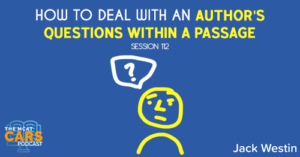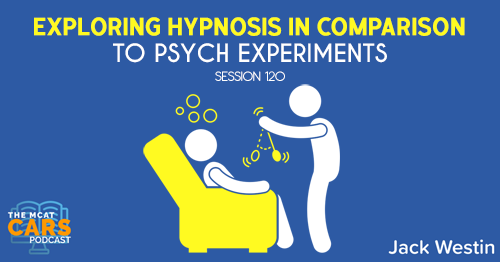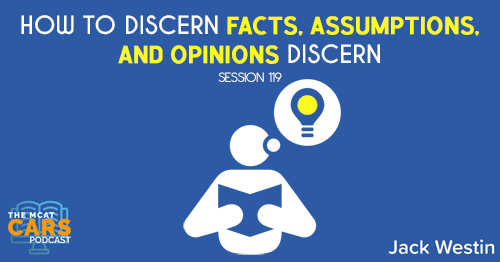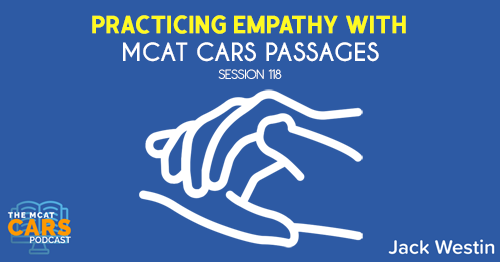Apple Podcasts | Google Podcasts
Session 112
Today, we discuss how to approach questions within MCAT CARS passages. Don’t insert your own answers! Let the author convince you with evidence and examples.
As always, I’m joined by Jack Westin from JackWestin.com. Check out all their amazing free resources including a free trial session of Jack’s full course to see how it’s like learning from Jack Westin himself.
Listen to this podcast episode with the player above, or keep reading for the highlights and takeaway points.
Link to the article:
https://www.theatlantic.com/science/archive/2020/10/gas-stoves-are-bad-you-and-environment/616700/
Heather Price knows her way around gases. An atmospheric chemist at North Seattle College, she studies outdoor air pollution, the flow and change of chemicals in Earth’s atmosphere. But she wasn’t worried about the gas stove in her own home before her son developed asthma and, at two and a half years old, had to use his inhaler multiple times a day. She started to wonder: Was gas making her family sick?
Price’s house ran on natural gas—“gas stove, gas furnace, gas hot-water heater,” she says. In American homes, this setup is quite common, but gas appliances—and gas stoves in particular—have costs. Cooking on a gas stove unleashes some of the same fumes found in car exhaust. If those fumes are not vented outside the house, they linger and sneak into lungs.
Price had always thought of residential pollution as coming from nearby trucks or highways, but when she followed up on her hunch, she found a trove of articles about the link between gas and pediatric asthma. Price and her husband decided to move out, to a new, all-electric home in the same zip code. Her family breathed the same neighborhood air; the only thing that changed was their house. Her son’s asthma improved almost overnight.
“Just like a doctor can’t say your cancer is from smoking for 20 years, there’s no way I can say as a scientist that my son’s asthma was because of us having gas in the home,” Price says. Still, it’s her best guess.
Most Americans these days use electric stoves, but approximately a third cook primarily with natural gas, according to a 2015 report from the U.S. Energy Information Administration. Many of these cooks swear by the blue flame, which can supercharge a cast-iron pan in a way that would put an electric coil to shame. Cooking over a fire may seem natural enough, but these stoves should be a hotter topic: Given advances in induction technology, concerns about the climate, health anxieties, or some combination of the three, should anyone be using one?
If you can afford to avoid it, probably not.
[02:49] Paragraph 1, Sentence 1
Heather Price knows her way around gases.
Jack says:
We’re given this person who knows their way around gases. We don’t know what kind of gases yet.
[03:05] Paragraph 1, Sentence 2
An atmospheric chemist at North Seattle College, she studies outdoor air pollution, the flow and change of chemicals in Earth’s atmosphere.
Jack says:
Now we know what kind of gases. So she studies pollution.
[03:22] Paragraph 1, Sentence 3
But she wasn’t worried about the gas stove in her own home before her son developed asthma and, at two and a half years old, had to use his inhaler multiple times a day.
Jack says:
We’re given this other picture. We go from outdoor air pollution that they specifically mentioned in the second sentence to her being worried about her gas stove, which would be indoor air pollution, and her son having asthma.
[03:57] Paragraph 1, Sentence 4
She started to wonder: Was gas making her family sick?
Jack says:
Hopefully, she has an answer because she’s the one studying it and she’s the chemist. Whether gas was making her sick is something we have to figure out. But try to leave your own information and knowledge and bias at the door.
Maybe what the author says is something that’s in line with what you believe. But that doesn’t have to be the case. It could be something totally off and outright wrong.
“At the end of the day, you have to stick to whatever the author says.”Click To Tweet[05:45] Paragraph 2, Sentence 1
Price’s house ran on natural gas—“gas stove, gas furnace, gas hot-water heater,” she says.
Jack says:
We’re giving a little history or backstory here of Heather Price’s house, and all the gas it’s using.
[06:01] Paragraph 2, Sentence 2
In American homes, this setup is quite common, but gas appliances—and gas stoves in particular—have costs.
Jack says:
Again, a little bit more history here in American homes. This is a common thing. But the gas stoves have cost. We don’t know what the costs are, whether that’s monetary costs or health costs.
This is confusing for students because they were expecting the answer to be laid out. That’s okay. You just have to keep reading until they answer it. But don’t let it go. Don’t forget about it. Why would the author talk about how gas is everywhere? Maybe it’s to make a bigger point and that this gas does contribute to our health problems.
“Remember that what you're reading is really a conversation. And as you read, you have to ask yourself, why is the author bringing this up?”Click To TweetWe have to keep reading to see since we don’t know yet. We don’t have to predict. But you have to ask yourself, what are we talking about? Why are we talking about this? Why has the author not answered the question yet? That’s okay. Be patient. Let the author speak. Let them develop their point.
[07:17] Paragraph 2, Sentence 3
Cooking on a gas stove unleashes some of the same fumes found in car exhaust.
Jack says:
So the author refers to some health costs out there going straight to some potential health issues. Comparing it to a car exhaust is terrible. We can probably imply or assume that it was making our family sick. But we shouldn’t assume that or we shouldn’t say that or suggest that in the questions until they really develop it more. So let’s keep reading and let’s see where they go. And hopefully, they’ll explicitly tell us, yes, this is the problem and that we should avoid gas.
[08:02] Paragraph 2, Sentence 4
If those fumes are not vented outside the house, they linger and sneak into lungs.
Jack says:
The author potentially here is on the side of answering yes, it’s making your family sick. But the author can make a direction change. So we just have to keep reading and decide in the end.
[08:39] Paragraph 3, Sentence 1
Price had always thought of residential pollution as coming from nearby trucks or highways, but when she followed up on her hunch, she found a trove of articles about the link between gas and pediatric asthma.
Jack says:
Heather Price and her research are finding a link between gas and asthma. Have they answered the question yet? Not directly. But they are giving you a lot of different evidence and points that lead to one answer.
That’s the point of an MCAT CARS passage. It’s not to just tell you their point. But it’s to convince you of their point. And the only way they’re going to convince you is by presenting examples, evidence, or other experts in the field that agree with the author. That’s what the MCAT is all about.
“If you are trying to look for a textbook answer or textbook solution, you're not understanding CARS.”Click To TweetCARS isn’t concerned about you understanding their point. It’s about convincing yourself of their point like actually believing it. And that’s what they’re going to test you on. It’s not a reading comp test in the normal sense. It’s a test of the validity of arguments, evidence, and support. So those are the things that you should be thinking about.
[10:16] Paragraph 3, Sentence 2
Price and her husband decided to move out, to a new, all-electric home in the same zip code.
Jack says:
They obviously came to their own conclusion enough to move out of their gas house to an electric house.
[10:31] Paragraph 3, Sentences 3-4
Her family breathed the same neighborhood air; the only thing that changed was their house. Her son’s asthma improved almost overnight.
Jack says:
So her son’s asthma improved almost overnight. We can assume but it’s still not straight out. And don’t be surprised if, at the very end, it goes the other way. There have been passages that say one thing the whole way through, and then at the very end, they’ll change their mind. So don’t just stop reading the passage assuming you already know the answers.
“Always finish the passage.”
[11:28] Paragraph 4, Sentence 1
“Just like a doctor can’t say your cancer is from smoking for 20 years, there’s no way I can say as a scientist that my son’s asthma was because of us having gas in the home,” Price says.
Jack says:
Even Heather Price who’s a scientist can’t categorically say that the gas is making her sick or her family sick.
[11:52] Paragraph 4, Sentence 2
Still, it’s her best guess.
Jack says:
This is another way to convince you. It’s rhetoric. That’s all it is. Rhetoric is all about trying to convey something and make sure you’re persuaded by it.
[12:49] Paragraph 5, Sentence 1
Most Americans these days use electric stoves, but approximately a third cook primarily with natural gas, according to a 2015 report from the U.S. Energy Information Administration.
Jack says:
It’s a little backstory of where we are with gas and electric stoves in this country.
[13:15] Paragraph 5, Sentence 2
Many of these cooks swear by the blue flame, which can supercharge a cast-iron pan in a way that would put an electric coil to shame.
Jack says:
The author here is saying that cooks who use gas will say that it’s better than an electric stove.
[13:59] Paragraph 5, Sentence 3
Cooking over a fire may seem natural enough, but these stoves should be a hotter topic: Given advances in induction technology, concerns about the climate, health anxieties, or some combination of the three, should anyone be using one?
Jack says:
It’s asking the question, should we be using it because of health reasons and climate reasons? So those are all the things that were brought up, not climate but health-wise in the first paragraph.
[15:06] Paragraph 5, Sentence 4
If you can afford to avoid it, probably not.
Jack says:
The author’s point here is if you can afford not to have a gas stove, then you shouldn’t have a gas stove. It took the whole passage to get to the answer. But along the way, they tried to convince us. That’s what makes a really good writer. They’re good at making you interested in a topic. They keep you along for the ride. And they give you subtle cues and ideas that insinuate the answer that make you want to believe that answer. So look out for that when you do these MCAT passages.
Links:
Link to the article:
https://www.theatlantic.com/science/archive/2020/10/gas-stoves-are-bad-you-and-environment/616700/
SEARCH SITE
SEARCH SITE
LISTEN FOR FREE












